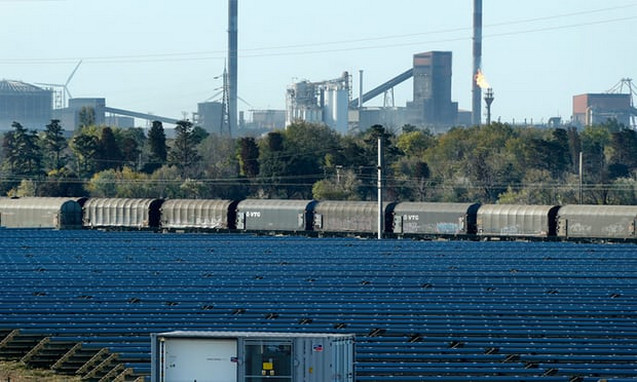While almost all companies have plans in place to reduce carbon emissions, those plans don’t go far enough, according to the Carbon Disclosure Project
 |
| EDF opens photovoltaic park near ArcelorMittal steel plant Fos-sur-mer. Many big companies are switching to renewable energy. Photograph: Guillaume Horcajuelo/EPA |
The Carbon Disclosure Project (CDP) also found that only 14% of its sample of 1,073 large companies around the world had “science-based targets” – that is, goals to reduce carbon emissions which are in line with the global agreement to hold warming to no more than 2C, enshrined in the 2015 Paris agreement.
“Targets [from companies] have previously been short in scope and pretty unambitious,” Marcus Norton, chief partnerships officer at CDP, told the Guardian. “That is improving.”
Companies are not bound by the Paris agreement, which requires country governments to take action to hold warming to no more than 2C, with an aspirational goal of keeping warming to even lower levels, of 1.5C. However, many large companies have taken their own steps to reduce greenhouse gas emissions, including investing in renewable energy, cutting down on waste and streamlining their operations.
Paul Simpson, chief executive of CDP, added: “This is great news for those companies seizing the opportunity of the low-carbon economy, but the rest need to pick up the pace or risk losing out. The majority of the large corporations we analysed do not yet appear to have the right science-based targets in place to successfully transition their business in line with the Paris agreement, though many have ambitions to take this step in the next two years.”
These efforts will continue despite the withdrawal of the US, the world’s biggest emitter, from the Paris agreement under President Trump. Governments will meet in Bonn this November under the auspices of the UN, a meeting known as COP23, to discuss the next steps to achieving the aims of the Paris agreement, and the attitude of the US government’s representatives will be keenly watched. Ahead of COP23, many companies and governments below the national level were keen to stress their commitment to fulfilling the aims of the Paris pact.
For instance, mayors of the cities of London, Paris, Los Angeles, Barcelona, Mexico City and Cape Town, along with a few others, announced they would stop buying petrol or diesel-driven buses from 2025 onwards, and that they would ensure that a large area of their city was “zero-emission” by 2030.
These actions are calculated to reduce air pollution, a serious problem in many major cities, as well as cutting down on global greenhouse gases.
Ahead of the Bonn conference, developing countries have also been a key focus. A group called the New Climate Economy has surveyed Africa and found that nations across the continent could benefit from environmentally sustainable economic growth, potentially “leapfrogging” developed countries by bypassing much of the fossil fuel economy in favour of clean technology, including renewable energy.
The report found that the best way to encourage such sustainable economic activity in Africa would be for governments to devise and implement new policies that would make investments in green growth more attractive, for instance by reducing existing subsidies for fossil fuels and removing import tariffs on sustainable technology.
Governments should also encourage entrepreneurship, the report found, by adapting policies to the conditions in their countries and of their economies, taking into account the available natural resources and the need to keep emissions low while lifting people out of poverty.
“Africa has the natural resources and the determination to instigate a green industrial revolution,” said Carlos Lopes, a member of the Global Commission on the Economy and Climate, professor at the Graduate School of Development Policy and Practice, University of Cape Town. “Now we need the right policies to unleash economic transformation, green growth and entrepreneurship across the continent. A more prosperous and sustainable future is within Africa’s reach, we just need to seize it.”
Links
- Picking up the pace
- Sustainable development
- Global climate change action 'unstoppable' despite Trump
- Paris climate change agreement enters into force
- Investors warn car industry over climate change
- World's scientists to join forces on major 1.5C climate change report
- UN drops deadline for countries to state climate change targets
- China makes its first commitment to climate change targets
- China's president expected to announce radical climate change targets

No comments :
Post a Comment